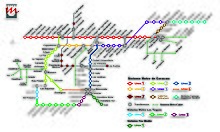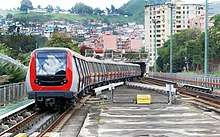Los Teques Metro
The Los Teques Metro is a suburban mass-transit system in the city of Los Teques, Venezuela with connections to important surrounding cities and communities. It was opened to public service on November 3, 2006.[1] The Los Teques Metro currently operates one service (branded as lines 1 and 2 for the two parts of the system) connecting 5 stations, with additional stations for Line 2 under construction.
| Overview | |
|---|---|
| Owner | Venezuelan government |
| Locale | Los Teques, Miranda, Venezuela |
| Transit type | Rapid transit |
| Number of lines | 1 (branded as 2 lines) |
| Number of stations | 5 |
| Daily ridership | 20,000 (approx. daily average)[1] |
| Operation | |
| Began operation | November 3, 2006[1] |
| Operator(s) | Metro de Caracas |
| Number of vehicles | 22 trains (each train is composed of 6 cars) |
| Technical | |
| System length | 11.2 km (7.0 mi)[1] |
| Track gauge | 1,435 mm (4 ft 8 1⁄2 in) (standard gauge) |
The system connects the city of Los Teques with the capital city of Caracas. The Los Teques Metro is operated by Metro de Caracas – as such, it is effectively a subsidiary/extension of the Caracas Metro, and is widely viewed as part of that system.[2] It is ascribed to the Venezuelan government and the Ministry of Infrastructure. The government of Miranda State and the mayorship of the Guaicaipuro Municipality are also financing its development.


The currently operating line runs for 11.2 kilometers (7.0 mi),[1] parallel to the San Pedro River, establishing a link between Las Adjuntas and Independencia Station.
History
The subway plans date back to 1982 when it was first proposed. However, it wouldn't be until October 19, 1998 when the Metro de Los Teques transit corporation was created (now defunct) in order to carry out management, administrative duties and civil works related to the project. It was supposed to alleviate the congestion of the Panamerican Highway and ease commuting between the two cities, because of their proximity. The operation was subsequently taken over by Metro de Caracas and plans were extended to include expansion to San Antonio and a 3rd line to connect to 2nd point in Caracas.
Construction for the first phase began in 2001 with works including the canalization of the San Pedro River, the tunneling and building of the bridges until reaching Las Adjuntas. It is estimated that the project cost was about 800 million US dollars.
The metro system began with restricted operations:
- 2 railways through a single tunnel;
- 2 or 3 trains;
- Daily service between 5:20 a.m and 11:00 p.m
Operations
The second rail within the same tunnel was formally inaugurated October 22, 2007. Trial and testing period continued with additional trains and full 7 day service from 5:10 a.m. until 11:00 p.m. implemented on November 19, 2007.
The 9.5-kilometer (5.9 mi)[1] ride between Las Adjuntas and Independencia as of July 5, 2015 is 4,00 bolívares Bs.F for a one way ride and the price includes a subway ride within the Caracas Metro network.
| Type | Coverage | Fare | Notes | |
|---|---|---|---|---|
| Subway | One Way | One ride to or from Los Teques to any Caracas Metro station | 4,00 Bolivares Bs.F | Valid for all Caracas Metro stations |
| Return Trip | 2 rides | 8,00 Bolivares Bs.F | same as above | |
| Multi-Abono Integrad | 10 rides | 40,00 Bolivares Bs.F | Available at all Caracas Metro stations | |
| Student Multi-Abono | 10 rides | 20,00 Bolivares Bs.F | Available at some Caracas Metro stations: Maternidad; Caño Amarillo; Parque del Este; El Silencio and Caricuao. | |
Los Teques Metro was provided with an integrated operation control centre, command and communications by Thales.
Future plans
Construction of the extension formally started March 20, 2007. This extension known as Line 2 to the system will be 12 km (7.5 mi) with 3 new stations within the city, 2 in nearby communities and finally terminating in San Antonio de Los Altos with the central Los Teques stations.
Line 4 adds four stations that are currently under construction are:
- Los Cerritos, inauguration TBA
- Carrizal, inauguration TBA
- Las Minas, inauguration TBA
- San Antonio, inauguration TBA
Line 3 has been proposed 18.5 km (11.5 mi). It will commence from San Antonio and connect some communities before looping towards the La Rinconada Caracas Metro Station.[3]
- La Morita
- San Diego
- Potrerito
- La Mariposa
- La Rinconada
Timeline of line extensions
| Line | Station | Station | Length | Status |
|---|---|---|---|---|
| 1 | Las Adjuntas | Ayacucho | 8.1 km | opened, on October 7, 2015 [4] |
| Las Adjuntas | Alí Primera | 9.5 km[1] | In everyday service, since November 3, 2006 | |
| 2 | Alí Primera | Guaicaipuro | 0.7 km | opened on December 11, 2012 [4] |
| Guaicaipuro | Independencia | 1.0 km | opened on December 1, 2013 [4] | |
| Independencia | Los Cerritos | 1.7 km | under construction, for service TBA | |
| Los Cerritos | Carrizal | 1.7 km | under construction, for service TBA | |
| Carrizal | La Carbonera | -.- km | under construction, for service TBA | |
| Carrizal | Las Minas | 4.3 km | under construction, for service TBA | |
| Las Minas | San Antonio | 2.5 km | under construction, for service TBA | |
| 3 | San Antonio | La Morita | 1.5 km | under construction, for service TBA |
| La Morita | San Diego | 1.6 km | under construction, for service TBA | |
| San Diego | Potrerito | 4.9 km | under construction, for service TBA | |
| Potrerito | La Mariposa | 3.0 km | under construction, for service TBA | |
| La Mariposa | Panamericana | 7.5 km | under construction, for service TBA | |
See also
- Caracas Metro
- Maracaibo Metro
- Valencia Metro
- List of rapid transit systems
- Transportation in Venezuela
- IAFE Venezuelan National Railway
References
- "SISTEMA METRO - CARACTERÍSTICAS POR LÍNEAS" [METRO SYSTEM - CHARACTERISTICS BY LINE] (in Spanish). C.A. Metro de Caracas. Archived from the original on 2013-12-05. Retrieved 2014-06-06.
- Robert Schwandl. "Caracas". UrbanRail.net. Retrieved 2014-06-06.
- "Metro Los Teques Line 2 contract signed". Railway Gazette International.
- "Metro Los Teques: 9 años conectando a Los Altos Mirandinos con Caracas | Correo del Orinoco". www.correodelorinoco.gob.ve. Retrieved 2016-04-01.